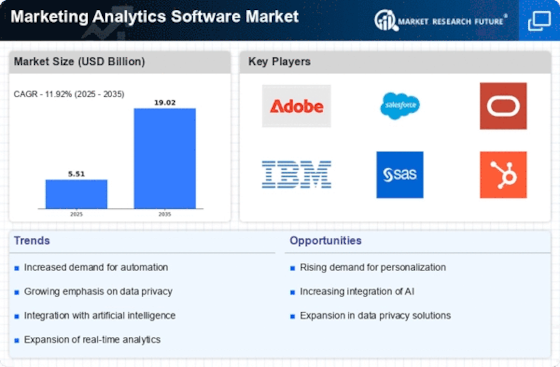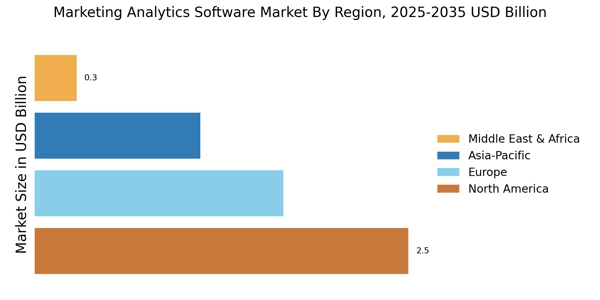Increased Focus on Customer Experience
In the Marketing Analytics Software Market, there is a growing emphasis on enhancing customer experience. Businesses are increasingly utilizing analytics tools to understand customer journeys, preferences, and pain points. By analyzing customer data, organizations can tailor their marketing efforts to meet specific needs, thereby improving engagement and satisfaction. This trend is reflected in the fact that companies that prioritize customer experience are likely to see a revenue increase of up to 10% within a year. As a result, the demand for marketing analytics software that can provide actionable insights into customer behavior is on the rise, making it a pivotal element in shaping marketing strategies.
Emergence of Advanced Analytics Techniques
The Marketing Analytics Software Market is witnessing the emergence of advanced analytics techniques, such as predictive analytics and machine learning. These technologies enable businesses to forecast trends, identify potential opportunities, and mitigate risks. The integration of such advanced methodologies into marketing analytics software is becoming increasingly prevalent, as organizations seek to harness the power of big data. It is estimated that the market for predictive analytics alone is expected to reach USD 10 billion by 2026. This shift towards sophisticated analytics tools signifies a transformation in how businesses approach marketing, allowing for more precise targeting and improved return on investment.
Growing Importance of Social Media Analytics
Social media platforms have become a vital channel for marketing, leading to a heightened focus on social media analytics within the Marketing Analytics Software Market. Organizations are increasingly utilizing analytics tools to monitor social media engagement, sentiment analysis, and brand perception. This trend is underscored by the fact that over 70% of marketers believe that social media analytics is crucial for understanding audience behavior. As businesses strive to enhance their online presence and engage with customers effectively, the demand for marketing analytics software that specializes in social media insights is likely to grow, making it an essential component of modern marketing strategies.
Rising Demand for Data-Driven Decision Making
The Marketing Analytics Software Market is experiencing a notable surge in demand as organizations increasingly recognize the value of data-driven decision making. Companies are leveraging analytics tools to gain insights into consumer behavior, optimize marketing strategies, and enhance overall performance. According to recent estimates, the market for marketing analytics software is projected to grow at a compound annual growth rate (CAGR) of approximately 14% over the next five years. This growth is driven by the need for businesses to adapt to rapidly changing market conditions and consumer preferences, thereby fostering a culture of informed decision making. As organizations strive to remain competitive, the adoption of marketing analytics software becomes essential, positioning it as a critical component in the strategic planning process.
Integration of Multi-Channel Marketing Strategies
The Marketing Analytics Software Market is adapting to the integration of multi-channel marketing strategies, as businesses seek to create cohesive customer experiences across various platforms. This trend necessitates the use of analytics tools that can aggregate data from multiple sources, providing a comprehensive view of marketing performance. Research indicates that companies employing multi-channel strategies can achieve a 30% higher customer retention rate. Consequently, the demand for marketing analytics software that supports multi-channel integration is expected to rise, as organizations aim to optimize their marketing efforts and enhance customer engagement across diverse channels.

















